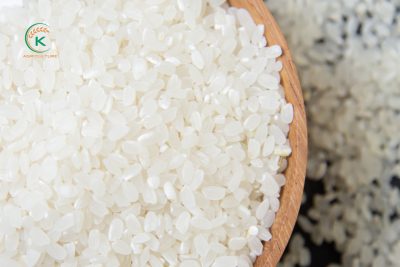Every day, thousands of Basmati rice exporters trade on the global market and you may be confused to choose one among them. Here’s where you can find the most useful information about Basmati rice exporters.
Contents
- 1 Basmati rice exporters: Types of Basmati rice they provide
- 2 Basmati rice exporters: Pakistan and India dominate the global market
- 3 Basmati rice exporters: Things that affect their business.
- 4 Basmati rice exporters: A guide to find the right one.
- 5 List of well-known Basmati rice exporters.
- 5.1 Rajesh Industries – one of the most famous basmati rice exporters in India
- 5.2 Taj Mahal- one of the most reputable Basmati rice exporters from India
- 5.3 HAS Rice- one of the leading company in the Pakistan Basmati rice export
- 5.4 From Pakistan HAS Rice Pakistan developed from a local supplier for domestic demand to one of the leading Basmati rice exporters. The company is assured to provide high-quality Basmati rice at competitive prices for markets like Sweden & Germany (Europe), Cameroon (CEMAC Region), and South Africa.
- 5.5 Bismillah Sehla Processing Plant-one of the top leading Basmati rice exporters.
Basmati rice exporters: Types of Basmati rice they provide
Basmati is a type of long, slender, and aromatic rice that is usually consumed in West Asia countries like India, Pakistan, Nepal, etc.

Basmati rice exporters: Types of Basmati rice they provide
The Basmati rice has unique characteristics that differ it from any other types of rice. But mostly, it is put in comparison with Jasmine rice – another popular type of rice, Basmati rice is cultivated in the Himalayas, India, and Pakistan while Jasmine is produced mainly in Thailand, Cambodia, Laos, and Vietnam. In addition, after being cooked, basmati keeps their slender shape and almost double in length. Whereas in contrast, Jasmine rice forms small sticky clusters where the grains have clumped together slightly. Moreover, Basmati rice has a more fragrant aroma and a nuttier taste.
Here are some of the kinds of Basmati rice that Basmati rice exporters should know
India Basmati rice
India is the major country exporting Basmati rice on the global market, making it the most renowned for Basmati rice export industry. The frequently exported Basmati rice from India is Basmati 370, the R.S. Pusa Basmati, and Basmati 385.
The cultivating areas are among the states of Haryana, Delhi, J & K, Himachal Pradesh, Punjab, Uttarakhand, and western Uttar Pradesh. Most Basmati rice from India is now consumed by buyers in Saudi Arabia, Iran, and UAE.
The price of Basmati rice from Indian Basmati rice exporters is around 119.4 USD/MT.
The Basmati rice is worth USD 4007 million in 2017. CUP brand is the most prevalent rice brand valued at USD 210 million in 2017. This brand mainly prefers sella rice to export. As per the seeds act 1966, there are eleven varieties of basmati rice grown in India such as basmati 386, basmati 217, Ranbir Basmati, Pusa Basmati, etc.
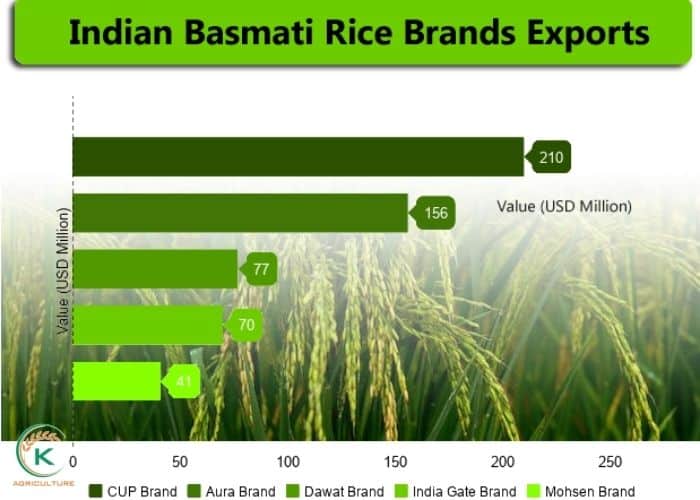
Top Indian basmati rice brands Source: export genius
Pakistan Basmati rice
Besides India, Pakistan is also well-known for many Basmati rice exporters. D-98, PK 385, and Super Kernel Basmati Rice are three types of Basmati rice that Pakistan supplies on the global market.
Most of Basmati rice exported from Pakistan nowadays is cultivated in Punjab province. The target markets of Basmati rice from Pakistan are Gulf countries, Australia, and the US. In comparison, Basmati rice from Pakistan is considered to have better quality than Indian one so the price of it is usually higher,
The price of Basmati rice from Pakistanis Basmati rice exporters is around 791,4 USD/MT.

Price of India Basmati rice and Pakistan Basmati rice
Basmati rice exporters: Pakistan and India dominate the global market
Currently, India comprises 85% of basmati export (7.2 million tonnes/year), followed by Pakistan with 2.7 million tonnes/year.
There are some reasons behind the domination of these two countries in the market of Basmati rice.
India and Pakistan – The homeland of Basmati rice.
Research shows that Basmati originated in the Indian Subcontinent – modern India, Nepal, and Pakistan centuries. With a long history of cultivating Basmati rice, farmers from these countries have plenty of experience to produce decent Basmati rice. In addition, favored by the weather conditions and improvement of cultivation, Basmati from these countries nowadays can meet the demand of the global market.

Origin of Basmati rice from India
Massive production capacity and expanding growing areas.
As the two major Basmati rice exporters, Pakistan and India have 1 million ha and 2.1 million ha respectively to grow and produce this type of rice.
Additionally, the developed techniques like land preparation, seed rate, seed treatment, method of nursery raising, weed control, etc to cultivate have boosted the production of Basmati rice. From 2011 to 2012, Pakistan has produced 2.4 million metric tonnes and India has produced even 5 million metric tonnes of Basmati rice.
The increasing production not only meets the demand of domestic consumers but also benefits the Basmati rice exporters since they have more Basmati rice to export.
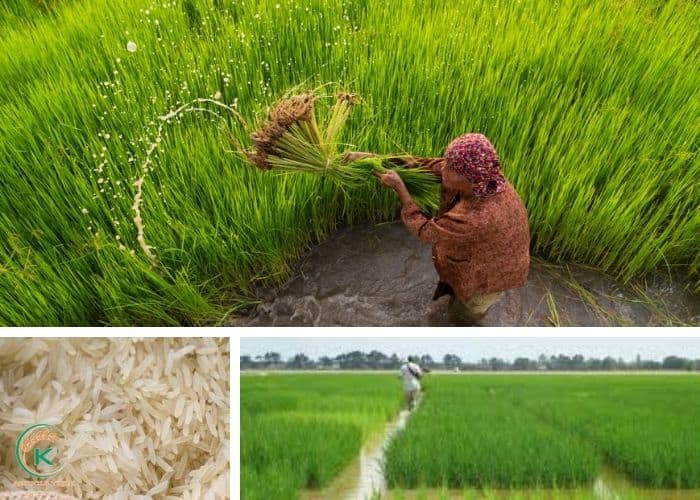
Large basmati rice-growing areas in India and Pakistan
Supporting Policies of the government
India and Pakistan had several policies to support the domestic production and the Basmati rice exporters.
The Agricultural and Processed Food Products Export Development Authority (APEDA) of India has made several steps to advocate for the Indian Basmati rice exporters.
APEDA sets up a campaign in major markets to promote the export of Basmati rice in Indian Brands in retail packs, in order to achieve higher unit value realization. In addition, they also prepare a Strategy for product 4. diversification and value addition in Basmati Rice.

Agricultural and Processed Food Products Export Development Authority (APEDA) of India
Continuous development of new varieties released by the Research Institutions like Indian Agricultural Research Institute (IARI), Pusa, Delhi, Basmati Export Development Foundation (BEDF), and the Agriculture Universities in the major Basmati growing states have helped farmers to achieve higher productivity and Basmati rice with greater resistance to disease and weather hazards. Currently, there are 34 approved varieties of Basmati Rice being cultivated in the country. Thus, the Indian Basmati rice exporters have more choices with the varieties of Basmati rice to export.

The Indian Basmati rice exporters have more choices with the varieties of Basmati rice to export
Remarkably, India has applied for protected geographical indication (PGI) status from the European Union’s Council on Quality Schemes for Agricultural Products and Foodstuffs. If the application is approved, India will have the sole ownership of Basmati rice title in the European market and definitely profit Indian Basmati rice exporters.
However, Pakistan has opposed this movement of India since their Basmati rice is also a major supplier for the EU. The sole power of India will put a huge impact on their Basmati rice exporters.
Currently, Pakistan and India are negotiating to find a concerted solution for this problem. This shows that either India or Pakistan are fighting for the rights and benefits of their local Basmati rice exporters.
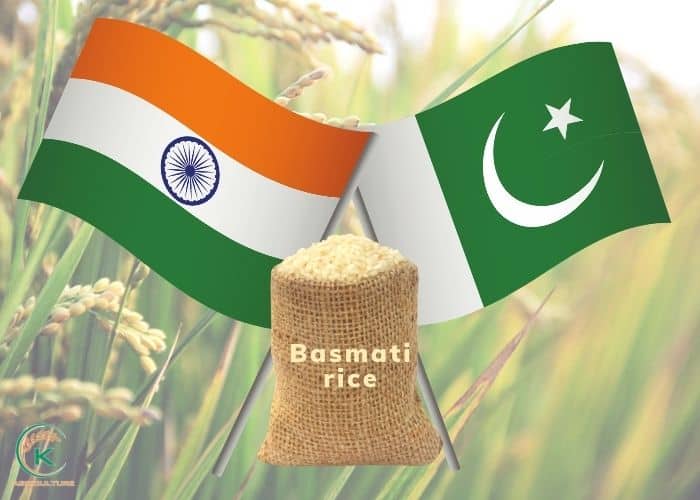
Pakistan and India are negotiating to find a concerted solution for Basmati rice exporters
Basmati rice exporters: Things that affect their business.
There are certain things that have great effects on the Basmati rice exporters.
Basmati rice production.
The supply chains of Basmati rice exporters rely on the production of Basmati rice. Thus, any factors of Basmati rice production can have a great impact on the Basmati rice exporters.
- Production capacity
The major source of Basmati rice to Basmati rice exporters is from countries with massive production capacities. For instance, in 2020, with the production at 4,4 million metric tons, India had approximately 5 million tons of Basmati rice exported by Basmati rice exporters in the same year.

Production capacity
- Weather conditions
The production of Basmati rice is also affected by natural hazards like droughts. In India, during the cultivation year of 2016-2017, catastrophic droughts in areas cultivating Basmati rice have damaged the production. The cultivation areas decreased from 2.1 million hectares to 1.6 million hectares. Thus, the production of Basmati rice fell from 9.8 billion to 8 million tons in the same year, leading to a decline in the basmati rice exporters’ distribution volume.

Weather conditions
- A shrinking growing area of Basmati rice
In Pakistan, the cultivation areas of Basmati rice have decreased by approximately 30%. Hence, the production has reduced sharply, resulting in the decline of Basmati rice supplying the Basmati rice exporters.
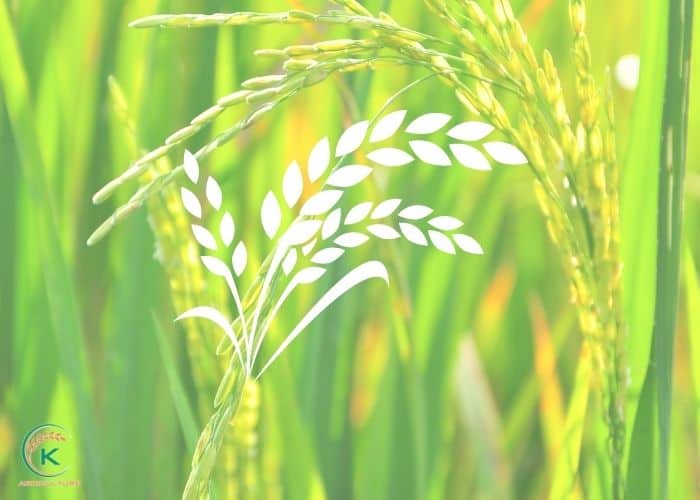
A shrinking growing area of Basmati rice
The impact of the Basmati rice title from India to the EU.
For the last few years, Pakistan has boosted its Basmati rice export to the EU market, taking advantage of Indian Basmati rice exporters with difficulties in meeting European pesticide standards. According to the European Commission, this country now provides 300,000 tons of Basmati rice, fulfilling 2/3 of the EU market demand. “For Pakistan, this is a really important market”, said Malik Faisal Jahangir, vice-president of the Pakistan Rice Exporters Association.
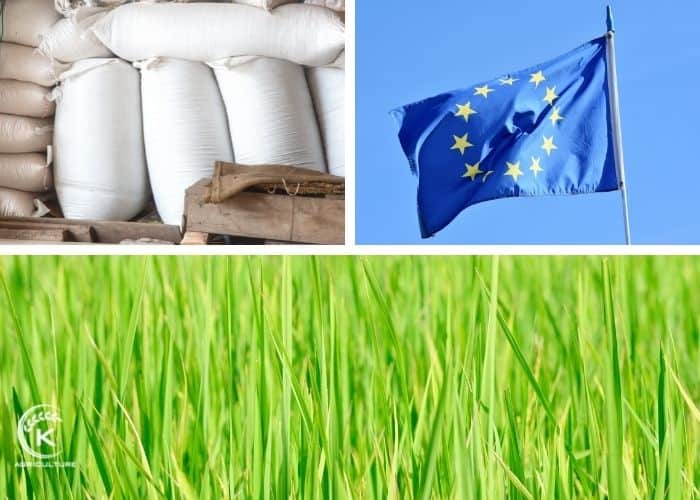
The impact of the Basmati rice title from India to the EU
However, if the title of Basmati rice from India is approved, the export of this type of rice from Pakistan will be badly impacted. Hence the Pakistanis Basmati rice exporters will be under the threat of losing competitive markets
Transportation of Basmati rice.
In 2020. high freight rates and a scarcity of containers have impacted the trade of many Basmati rice exporters.
Freight rates to West Asia, which accounted for 75% of trade, rose about 243% after the lockdown to $1,200-1,500 per container, while freight for shipment to Caribbean countries increased 344% to $4,200-4,500 per container during the same period.
As the price for transportation rose, Basmati rice exporters had to raise the price of their products. However, Basmati rice exporters were not able to increase the prices of rice significantly for fear of losing business to other countries.
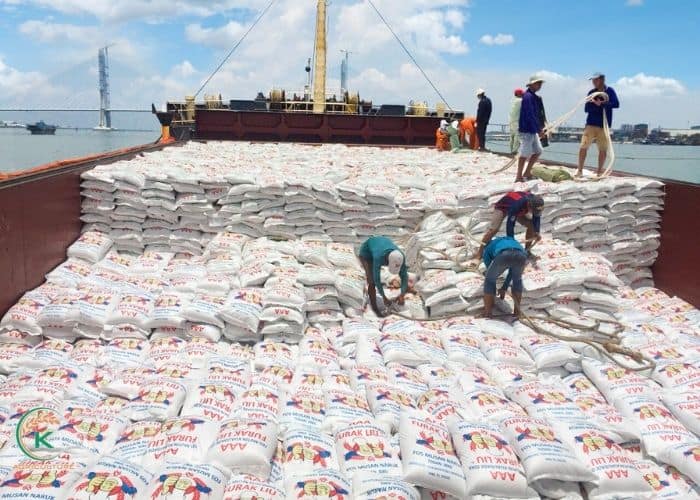
Transportation of Basmati rice
Basmati rice exporters: A guide to find the right one.
Here are some aspects of Basmati rice exporters that you should consider to find a suitable one to trade with.
Basmati rice exporters: Features of a reliable one.
In order to find reliable Basmati exporters, you should take into account the following matters.
- Legal business licenses.
If you are a wholesaler trading with Basmati rice exporters, remember to require a legal business license and other certifications from them. A reliable supplier must be qualified by the local authorities.
- Clear local address.
Check out whether the Basmati rice exporters have any precise, existing office, showroom, factory, etc. Consider meeting them at their location to make sure that their business is doing well.
- Certificate profile of exporters.
ISO 9001, FSSC 22000, Global GAP, etc are some types of qualifications that Basmati rice exporters need in order to enter markets like the EU, US, etc. You should definitely ask the suppliers to provide them.
- Feedbacks from former customers
The descent purchases in the past with former buyers will show the prestige of any Basmati rice exporters. You may consult other importers in order to find a reliable supplier for your business.
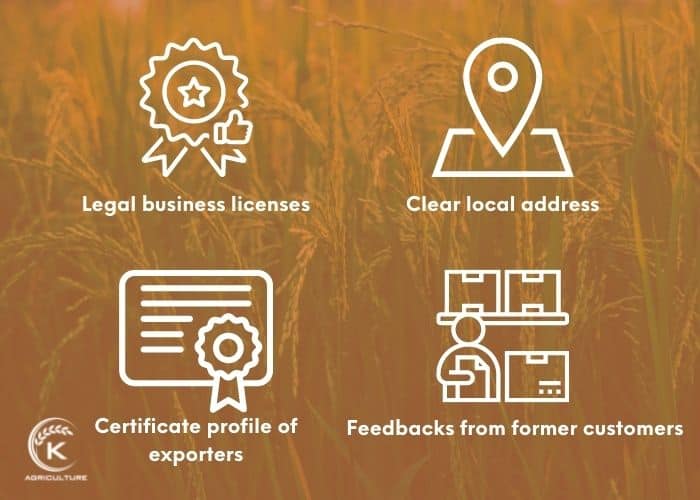
Basmati rice exporters: Features of a reliable one.
Read more: Top wholesale rice companies
Identifying dishonest Basmati rice exporters.
Below are some signs of the unreliable Basmati rice exporters.
- Vague information of the exporters.
Unclear information about the business, location, origin of Basmati rice, and legal business licenses to export are some signs of some unreliable Basmati rice exporters.
- Offering at a too low price.
Though the price of Basmati rice can fluctuate over time and different Basmati rice exporters will provide rice with different prices, you should be careful when your suppliers offer at too low prices. Instead of contacting just one exporter, consult the prices of different Basmati rice exporters in order to find your suitable one.
- Unprofessional working behavior.
If the Basmati rice exporters cannot provide samples, catalogs, or even avoid meeting in person, that means you are dealing with deceptive ones.

Identifying dishonest Basmati rice exporters
How to find reputable Basmati rice exporters
Here are some ways to find your Basmati rice exporters.
- On the Internet.
There are many sources on the Internet where you can find Basmati rice exporters like websites, social media, and e-commerce platforms.
However, you may run the risk of dealing with scammers and losing money because of the huge number of Basmati rice exporters on the Internet. So be wise with every choice you make online with your exporters.

On the Internet
- From agricultural fairs
Attending agricultural fairs not only gives you the chance to find suitable Basmati rice exporters but also your potential customers.
Nevertheless, during the outbreak of the Covid-19 pandemic, many countries closed their boundaries and many trading fairs for Basmati rice exporters and buyers were called off. This way is not really ideal during this pandemic period.
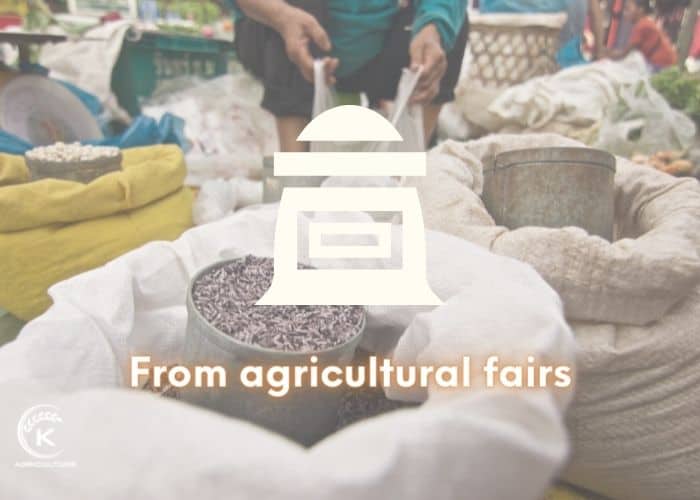
From agricultural fairs
- Consulting Brokers
If you are a beginner and are confused with choosing among many Basmati rice exporters, you can consult experienced brokers to find a suitable one. However, you may need to pay them some money in order to find suitable Basmati rice exporters.
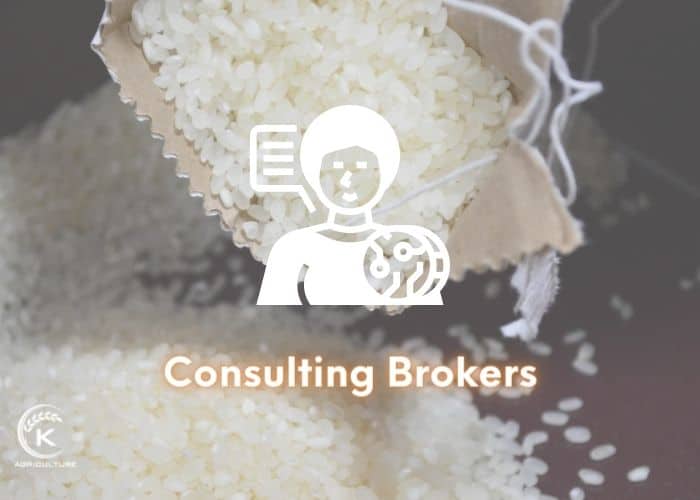
Consulting Brokers
Steps to work with Basmati rice exporters.
Here are some main steps that you need to do when trading with Basmati rice exporters.
- Understand the laws of your importing location
Understanding the law of importing Basmati rice can not only save your rights to trade but also protect you from deceptive Basmati rice exporters. Additionally, never let your business be affected by violating any laws of your local areas.
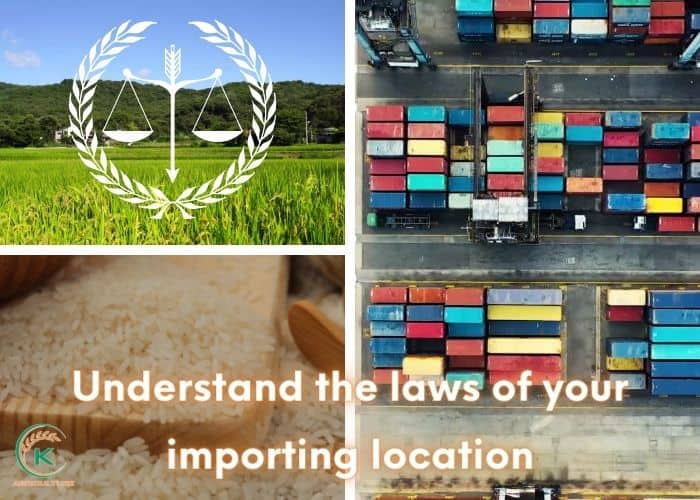
Understand the laws of your importing location
- Find your own market
Thoroughly do research and analyze many markets before finding the Basmati rice exporters because you do not want to import the product to areas where they do not consume it.

Find your own market
- Establish a Storage system
Temperature, moisture content, container atmosphere, and storage container are aspects that you definitely need to take into account in order to form your own storage system after receiving rice from Basmati rice exporters.

Establish a Storage system
- Find trustworthy Basmati rice exporters.
Take into account all the factors we mention above to find your suitable Basmati rice exporters. In addition, be wise to identify scammers that try to deceive you.

Find trustworthy Basmati rice exporters
- Check the quality of rice from Basmati rice exporters.
You should ask for samples of products from Basmati rice exporters before asking for the price list.

Check the quality of rice from Basmati rice exporters
- Establish a Safe Payment System
Even when trading online or offline, you can also take risk of being misled by your Basmati rice exporters. So forming a safe payment system is indispensable.
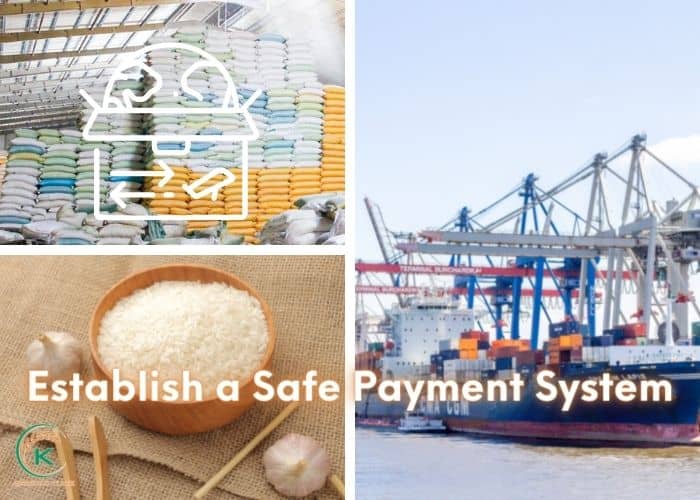
Establish a Safe Payment system
- Compare the price of different Basmati rice exporters and negotiate prices.
Like what we have mentioned, prices of Basmati rice can be changed over time and vary from exporters to exporters, make sure you have consulted any suitable Basmati rice exporters you know. After choosing the right one, try to negotiate with your Basmati rice exporters to get the product at the most reasonable price.
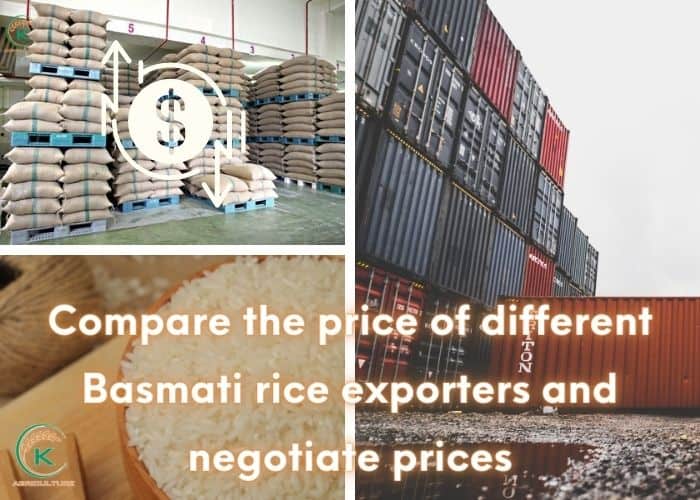
Compare the price of different Basmati rice exporters and negotiate prices
- Sign the contracts with Basmati rice exporters
Make sure that you read and be aware of every term of the contract with Basmati rice exporters before signing. For the payment, there must be at least two times for you to pay: one before trading and one after receiving the product.

Sign the contracts with Basmati rice exporters
- Receive the products and give feedback to the Basmati rice exporters.
After receiving your product, thoroughly check the quality, quantity of the Basmati rice and also give the Basmati rice exporters feedback in order to make further purchases in the future.

Receive the products and give feedback to the Basmati rice exporters.
List of well-known Basmati rice exporters.
If you are wondering how to export basmati rice from India or Pakistan, here are some recommendations of prestigious Basmati rice exporters for wholesalers.
Rajesh Industries – one of the most famous basmati rice exporters in India
With over 100 employees and experience in exporting rice to markets like US, Saudi Arabia, Rajesh Industries has become one of the most popular Basmati rice exporters in the market. In comparison with other Basmati rice exporters, the industry also has a modern automatic milling plant to process and pack the Basmati rice products to limit the touch of human hands during the manufacturing process.

Rajesh Industries- one of the most famous basmati rice exporters from India
Rajesh industries are globally known as a leading manufacturer and among the top rice exporters of Rice, Pure Basmati Rice, Sella Rice, Organic Rice & 1121 Basmati Rice to over 25 countries
Below are some certifications for Basmati rice exporters that the company has
- BRC Food Certification
- FSSAI Certificate
- ISO 22000:2005 SGS Certification
- USDA Organic Certification
- Organic EU Certification
- NPOP Certification
- IRAN GMP Certification
- Star Export House Certification
- USA FDA Certification
With the qualification from many international clients, Rajesh industries are now one of the top Basmati rice exporters that every international wholesaler should know
Taj Mahal- one of the most reputable Basmati rice exporters from India
Taj Mahal is among the most famous Indian Basmati rice exporters. This exporter has over 60 years of trading in the global market and also possesses 2 modern milling plants so they only high-quality Basmati rice for traders around the world.
Taj Mahal has a wide range of products. They are:
- Taj Mahal Maxi-Long -Steamed Basmati 1121 Rice
- Taj Mahal Maxi-Long -Sella Basmati 1121 Rice (Parboiled)
- Taj Mahal Maxi-Long-Golden Sella Basmati 1121 Rice (Double Parboiled)
- Taj Mahal XXXL-Steamed Basmati 1121 Rice
- Taj Mahal Fiesta-Steamed Basmati Rice
- Taj Mahal Zest-Basmati Rice
- Taj Mahal Relish-Basmati Rice
- Taj Mahal Nourish-Brown Basmati Rice

Taj Mahal- one of the most reputable Basmati rice exporters from India
After 60 years of exporting in the markets, the Taj Mahal has exported to over 45 countries. Among many Indian Basmati rice exporters, the Taj Mahal was chosen to trade with over 300 clients around the world, making it one of the top leading Basmati rice exporters in the world.
HAS Rice- one of the leading company in the Pakistan Basmati rice export
From Pakistan HAS Rice Pakistan developed from a local supplier for domestic demand to one of the leading Basmati rice exporters. The company is assured to provide high-quality Basmati rice at competitive prices for markets like Sweden & Germany (Europe), Cameroon (CEMAC Region), and South Africa.
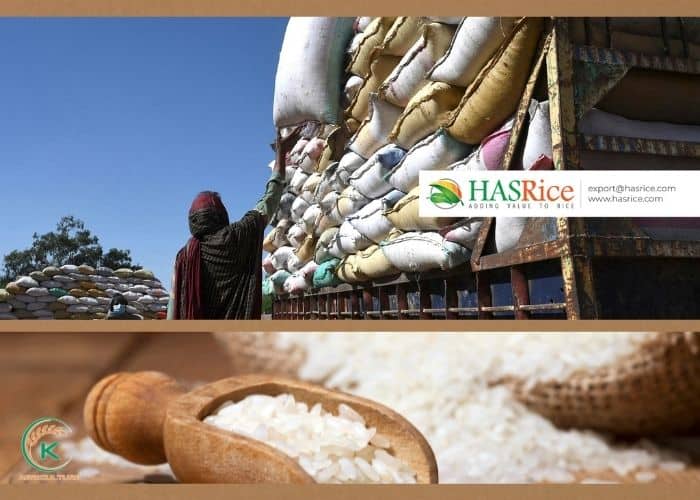
HAS Rice- one of the leading Basmati rice exporters from Pakistan
HAS Rice provides the following types of rice:
- Pakistan Long Grain White Rice
- Pakistan Super Kernel Basmati Rice
- Pakistan Long Grain Basmati Rice
- Pakistan Non-Basmati Fragrant Rice
- Pakistan Broken Rice
For Basmati rice, in particular, they are exporting:
- D98/PK385 Basmati White Rice (pure Basmati white rice)
- Premium Super Kernel Basmati Rice (Premium Basmati rice)
- Long grain 1121 Basmati rice (XXL Basmati rice)
Along with having a modern manufacturing process, they also receive a lot of certificates for Basmati rice exporters. They are:
- ISO 22000: 2005
- Certificates from Rice Exporters Association of Pakistan
- Certificates from Karachi Chamber of Commerce and Industry
- British retail consortium global standards
- With this number of certificates, they are now among the most prominent Basmati rice exporters in the market.
Bismillah Sehla Processing Plant-one of the top leading Basmati rice exporters.
Standing out from many Basmati rice exporters from Pakistan is Bismillah Sehla Processing Plant. Every year, they produce over 30,000 tons and trade with 1342 customers from over 15 different countries around the world.
The rice they are supplying are:
- 1121 Basmati Rice
- PK-386 Rice
- SUPER BASMATI Rice
- C9 Rice

Bismillah Sehla Processing Plant-one of the top leading Basmati rice exporters.
Along with the development, Bismillah Sehla Processing Plant has received several certificates:
- BRC (British Retail Consortium) certificate
- Good Manufacturing Practice (GMP) certificate
- FSSC 22000: Food Safety Management Systems
- ISO 9001 2015
- Sedex (Supplier Ethical Data Exchange)
With 34 years in the market, Bismillah Sehla Processing Plant is now standing on top of many Basmati rice exporters and is trusted by thousands of customers around the world.

K-Agriculture Factory
K-Agriculture Factory is the best wholesale rice factory in Vietnam, offering many rice types such as ST rice, jasmine, and japonica. Our distribution reaches 80 countries including the USA, the EU, China, and the Philippines.
For special discounts and free consultation, contact us now via
Email: info@k-agriculture.com
WhatsApp: +84855555694

